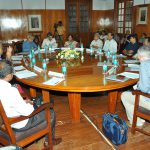On June 30, 2017, a meeting was held at the Indian Institute of Science (IISc) that included participation from representatives of several research institutes across the country. Prof. Anurag Kumar, Director, IISc, announced the launch of the GenomeIndia initiative to sequence thousands of Indian individuals in order to unravel details of the Indian genome. Dr. Soumya Swaminathan (DG, ICMR) highlighted the importance of representation of the diverse Indian population from all corners of the country in order to make genetic studies successful. In the long run, ICMR, in conjunction with DBT, would support a national biobanking system, and she appreciated the undertaking of whole genome sequencing for several thousand individuals as a significant step towards that goal.

Dr. K. Vijayraghavan (Secretary, DBT) conveyed that he is delighted to see this kind of ambitious venture that will succeed when dovetailed with other ventures under discussion now in the Government of India. Mr. Kris Gopalakrishnan (Ex-CEO and Co-Founder, Infosys), who has been very supportive of this initiative was also present, and lauded the collaboration of several research institutes in the country to collect more information from the enormous data that this initiative generates to arrive at solutions for use in the medical front in India.
Efforts towards identification of genes and genetic variations that underlie many common diseases in the Indian population have been negligible, as a majority of the work on studying the human genome so far has focused on a more homogeneous population of European ancestry. India also has a very high burden of genetic disorders (also known as Mendelian disorders). For example, every year, over 100,000 babies are born with genetic disorders. Unfortunately, there is currently very limited understanding of the genes responsible for many of these Mendelian disorders, thus limiting their accurate diagnosis. The key reason is that there is no catalog of genetic variations for Indians and their categorization into disease/non-disease causing variations. Building this catalog of genetic variations will pave the way for conducting better research on genetic disorders, and will also enable physicians to provide accurate diagnosis of genetic disorders at a much cheaper price in the near future.
 To help build this catalog of genetic variations, a group of leading researchers and medical practitioners across India have come together to form the GenomeIndia initiative. The initiative was launched at the Indian Institute of Science in association with the Centre for Brain Research, which was established at IISc through a generous gift from Mr. Kris Gopalakrishnan.
To help build this catalog of genetic variations, a group of leading researchers and medical practitioners across India have come together to form the GenomeIndia initiative. The initiative was launched at the Indian Institute of Science in association with the Centre for Brain Research, which was established at IISc through a generous gift from Mr. Kris Gopalakrishnan.
Other eminent scientists present at the meeting include Prof. Nagaraja (President, JNCASR), Dr. Mohan (Director, MDRF), Prof. CVR Murthy (Director, IIT Jodhpur), Prof. Radhakrishna Pillai (Director, RGCB), Prof. G N Rao (Director, LVPEI), Prof. Apurva Sarin (Dean, inSTEM-NCBS), Prof. K Thangaraj (Senior Principal Scientist, CCMB), Prof. Sharat Chandra (Director, CHG), Prof. Analabha Basu (NIBMG, Kalyani) and Dr. Hanjabam Nanaocha Sharma (Scientist, IBSD), among many others.
The GenomeIndia initiative will be based on the Next Generation Sequencing platform – the latest and best in sequencing technologies to sequence the genome of thousands of Indians, so that there is adequate representation in terms of geographical coverage, caste, tribal and linguistic groups. Given the uniqueness of an individual’s genetic make-up, we might be closer to realizing the dream of providing tailored medical treatments and prescribe drugs based on an individual’s genetic make-up, often referred to as Precision Medicine. With the successful execution of this initiative, the hope is also to stand tall in the world research map where projects like Genomics England, US precision medicine initiative, Genomes of Netherlands are underway to develop precision medicine efforts in their respective countries.
As the genetic landscape differs across the world, it is necessary that genetic data is shared in order to derive greater knowledge from information and serve the purpose of enabling better treatment outcomes. It is envisaged that GenomeIndia will interact and share resources with ongoing worldwide efforts. In particular, GenomeIndia is expected to collaborate closely with GenomeAsia100K since it represents populations from South and South-East Asia.
The GenomeIndia initiative will pave the way for identifying genes and genetic variations for common diseases, treating Mendelian disorders, enabling the transformation of the Precision Medicine landscape in India, and thus improving the healthcare of the general population in our country.



 To help build this catalog of genetic variations, a group of leading researchers and medical practitioners across India have come together to form the GenomeIndia initiative. The initiative was launched at the Indian Institute of Science in association with the Centre for Brain Research, which was established at IISc through a generous gift from Mr. Kris Gopalakrishnan.
To help build this catalog of genetic variations, a group of leading researchers and medical practitioners across India have come together to form the GenomeIndia initiative. The initiative was launched at the Indian Institute of Science in association with the Centre for Brain Research, which was established at IISc through a generous gift from Mr. Kris Gopalakrishnan.